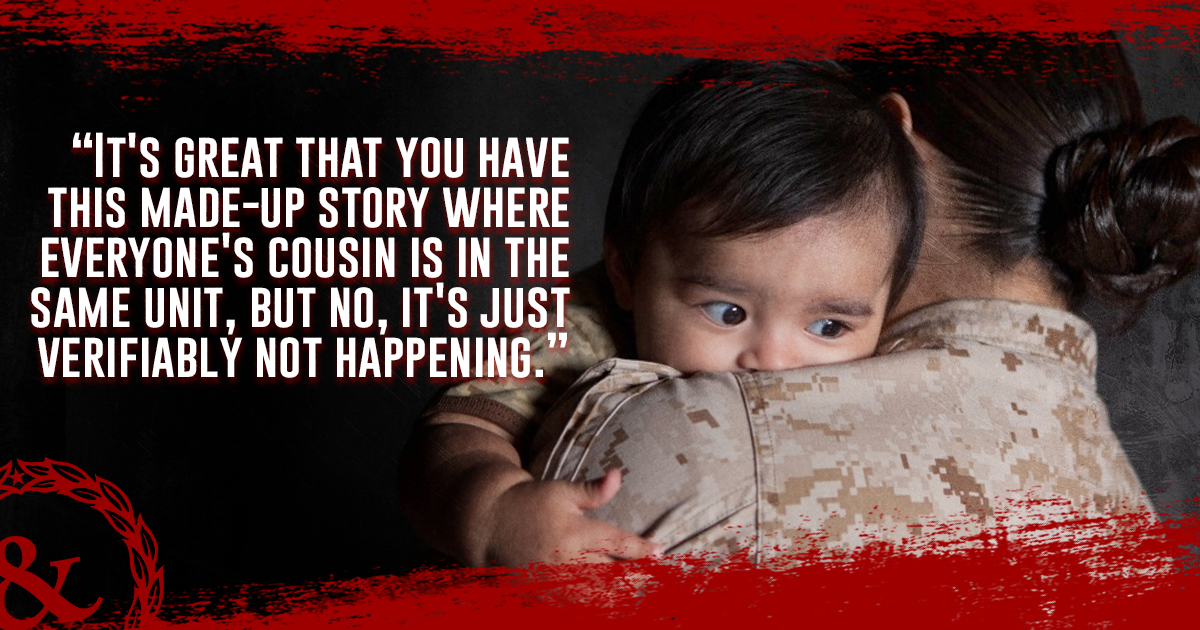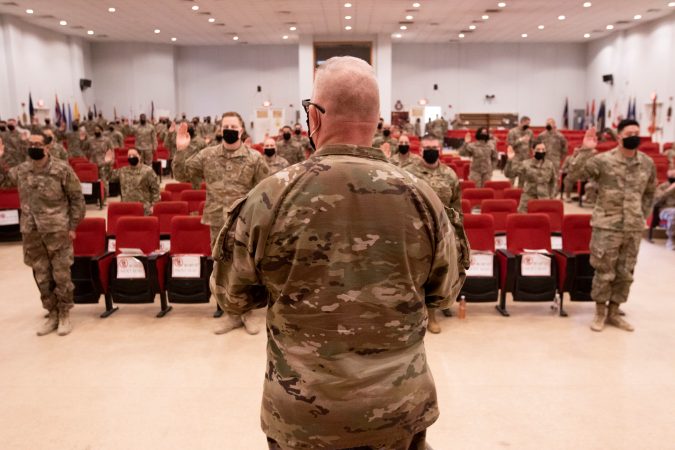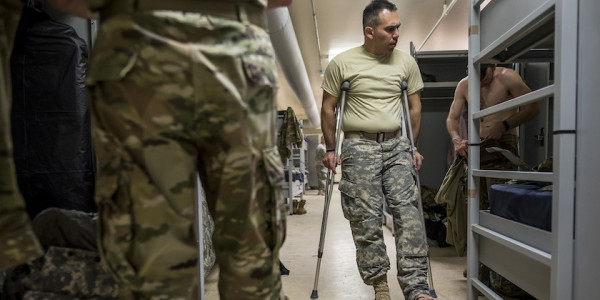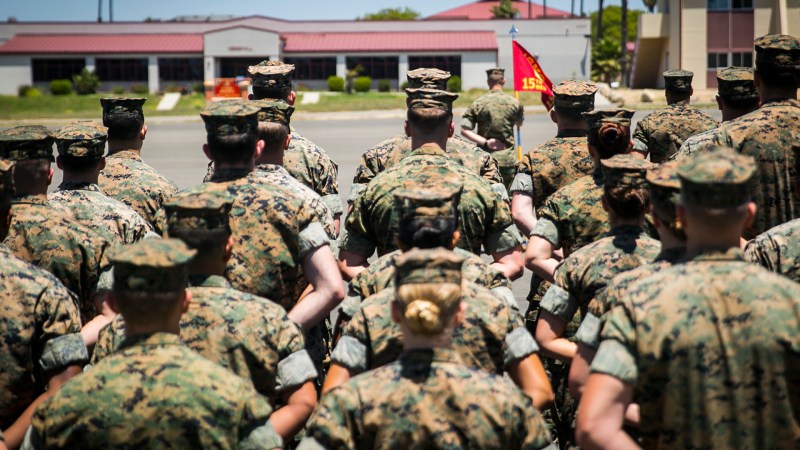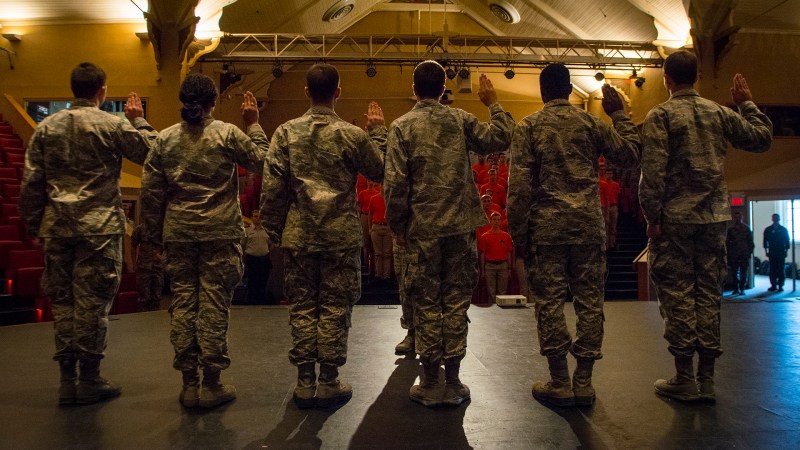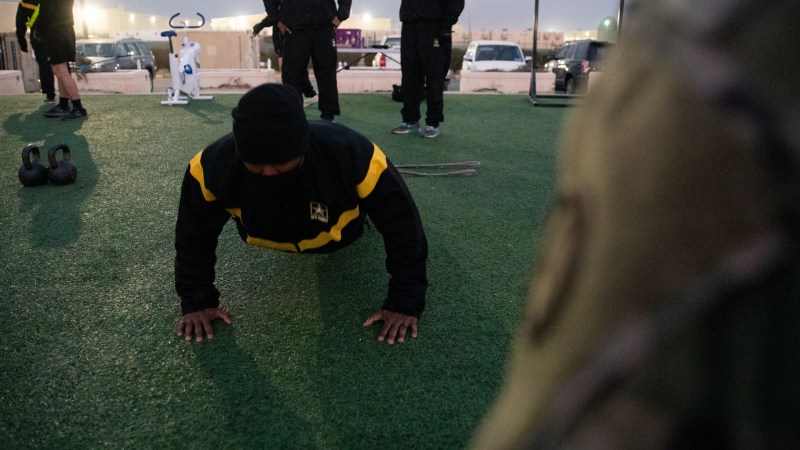Jeannette Haynie loved flying Cobra helicopters.
By 2006, the Marine officer had deployed three times, flown countless missions, and planned to keep flying on active duty for as long as she could. Kids were never part of the picture… until she got pregnant.
At first, Haynie and her commanding officer kept the news quiet as they applied for a waiver so that she could continue to fly. But eventually, word got out that someone in the unit was pregnant, though Haynie’s male peers were not sure who.
“‘Hey, some chick in the squadron got herself knocked up. Can you find out who?’” Haynie recalled one of her fellow pilots asking. “They were making bets about who it was and guessing that whoever it was had gotten pregnant to get out of deployment. Because they didn’t think it would be me. I was a captain, I had that privilege of rank, and I’d deployed with them.”
What Haynie remembered most about that moment was the insinuation that the woman purposely got pregnant to avoid deployment and the gleeful, spiteful way that a group of fellow Marines were snickering at and attacking her.
“I felt betrayed,” she added. “It made me wrap my arms around my belly with my daughter inside and cry.”
Haynie is not the only servicewoman made to feel like this: multiple government reports and interviews conducted by Task & Purpose show that women across the military are often bullied because of the stereotype that servicewomen get pregnant in order to avoid deployment, despite there being no substantial evidence that that actually happens. In fact, Haynie said she had it easy compared to what many enlisted servicewomen go through.
“[My unit] hated me,” one enlisted woman told Pentagon researchers in 2019, explaining that her colleagues ostracized her for getting three months of maternity leave and being assigned to work desk duty.
“It makes you feel guilty about wanting to have a family,” she said.
The stereotype is so widespread that it’s a fact of life in some branches.
“It’s something everyone just knows,” one enlisted male Marine told Corps researchers in 2017. “I’m sure some of it is stereotypes. I’m sure some of it is perception that doesn’t quite match up with reality. But the reality is absolutely there too.”
Though many internet commenters and even some high-ranking officials promote this stereotype, there is nowhere near enough evidence to justify it or the effect it has on servicewomen.
“You’re constantly thinking, ‘If I get pregnant, they’re going to think I’m trying to get out of deployment,” Genevieve Chase, an Army combat veteran who deployed twice to Afghanistan, told The War Horse in February.
The stereotype also makes no logical sense: Women rarely get pregnant at a time of their choosing; there are other less demanding ways of skating out of deployment, and male service members miss deployments at far higher rates due to injuries, legal issues, or other problems.
“Yes, there will always be those who abuse the system, just as with any system,” Haynie wrote in a 2012 blog post for the U.S. Naval Institute. “But we don’t ban single 21-year-old men from the military, even though they tend to get in trouble easily. The abusers, while legendary in many people’s minds, are actually fewer and further between than one might expect from the discussion.”
The reason why the stereotype is so widespread lies in a complex web of ignorance, misogyny, and outdated policies surrounding pregnancy and motherhood in the military. By preventing countless women from continuing their military careers, these policies not only keep alive a tradition of anti-pregnancy bias within the armed forces — they also push out highly-trained and motivated service members.
The good news, as experts pointed out, is that the policies don’t have to stay that way.

How does pregnancy impact deployment?
Every branch of the military keeps track of how many of its service members are non-deployable, a status that can be assigned for a variety of reasons. These include administrative hiccups, legal problems, and medical reasons, which include pregnancy. The “pregnant” category includes both women who are pregnant and in their one-year postpartum deployment deferment period.
This data does not include whether its non-deployable service members intended to become non-deployable, but it enables us to at least compare the impact of pregnancy on readiness to that of other categories.
Department of Defense data provided to Task & Purpose shows that non-deployable service members usually make up about 3% to 8% of any service branch’s population. Non-deployable pregnant service members comprise barely one percent of any branch.
In fact, in the Army, 3,000 more active-duty soldiers were non-deployable due to legal reasons in 2019 (6,325 soldiers a month on average) than due to pregnancy (3,454 soldiers). In the Marine Corps, about 700 more Marines were non-deployable due to administrative problems every month (about 1,940 Marines) than from pregnancy (1,249 Marines). Pregnant or post-partum Marines accounted for 0.003% to 0.005% of the Marine Corps’ end strength, officials said.
Related: 4 Service Members Arrested Over Weekend On Okinawa For Really Stupid Sh*t
The Air Force and Navy had the largest monthly average of pregnant service members (4,936 airmen and 4,524 sailors) in 2019. But even here, pregnant service members made only a small dent on readiness overall.
Although pregnant airmen constituted 14% of the branch’s non-deployable population in 2019, that’s just about 1% of the branch’s overall strength and is roughly equivalent to the number of airmen who were non-deployable due to administrative reasons. In the Navy, pregnant sailors averaged 1.26% to 1.41% of the active-duty force in 2019, while the total non-deployable population that year ranged from 3.6% to 4.29%.
There are limitations to the data. For example, it does not track whether the service members were attached to units scheduled to deploy. That means there may be service members who were able to time their pregnancies to not interfere with deployment but are still counted in the non-deployable category.
Despite the limitations, the data shows that even if all pregnant servicewomen are trying to skip deployment, pregnancy has a similar, if not lighter, impact on readiness than many other non-deployable categories.

‘Some sort of different pariah’
Navy veteran Emily Smith, who requested a pseudonym for this article to protect her active-duty husband, noticed during her time in uniform that there were far more men missing duty than pregnant women. Smith, a former information warfare officer in a support unit with a high operational tempo, saw male sailors take medical leave for injured knees, bad backs, and motorcycle accidents. Others jeopardized deployments with drunk driving arrests, domestic violence incidents, or even divorce.
“We had guys washing out for DUIs, we had guys testing positive for drugs,” she said. “I know there’s more men than women in the military, but we lost guys from every single team for dumb shit … way more than anybody who was pregnant.”
Cobra pilot Jeannette Haynie also noticed more non-deployable men than pregnant women.
“What about the staff sergeant who pops positive [on a drug test] two months before a deployment?” Haynie wrote in her 2012 blog post. “Or the Marine who steals a car in Okinawa and gets arrested by the Japanese police? The senior officer and department head who gets a DUI? The Marine whose mother gets terminally ill?”
These other categories of non-deployability beg a separate question: out of all the ways to get out of deployment, why would someone choose the incredible challenge of pregnancy, and the life-changing commitment of parenthood?
“Just roll your ankle,” said Martina Chesonis, an Air Force reservist and communications director for the Service Women’s Action Network, a nonprofit advocacy group for servicewomen and female veterans. “You do not need to have a child to get out of a deployment. There are so many other things that you can do.”
Rolling your ankle also has the advantage of not being stigmatized. While Marine pilot Kyleanne Hunter didn’t roll her ankle, she did accidentally break her foot when a Hellfire missile fell on it.
“I had a temporary light-duty profile, but nobody said ‘oh clearly you’re just looking to get out,’” she said. “Pregnancy is treated as some sort of different pariah.”

But why? One enlisted Marine believes it is a numbers game.
“Are there shitty females who are malingerers, who get pregnant to get out of deployments and who are barracks hoes or whatever? Yeah. Of course, there are,” she told Marine researchers in 2017. “Are there shitty dudes who are the equivalent? Yes, of course, there are. But because they are a smaller portion of the population, they are much more visible when they do screw up.”
That may be true, but it’s not the only answer for why pregnancy has such a unique stigma within the military. Sources pointed to three explanations: ignorance, misogyny, and structural bias that makes being a mother in the military nearly impossible.
The third reason is especially relevant because it prevents many highly-motivated and well-trained women from serving lifelong military careers. From a national security perspective, that loss of trained personnel is both expensive and dangerous at a time when many experts fear most of the U.S. population is ineligible for military service.
These ineffective policies enforce the perception that military service is mutually exclusive with motherhood and, by extension, womanhood. Fortunately, those policies can be changed and the situation of military mothers improved.
Ignorance
In a 2018 report, Marine researchers wrote that “the fact that female Marines — let alone pregnant Marines — are so rare contributes to pregnant and breastfeeding Marines’ being met with confusion, and that can lead to hostility.”
One female Marine put it more bluntly:
“There’s no fucking way that enough male Marines have interacted with enough female Marines for them to understand what it is they bring and how they’re not really that different,” she told researchers.
Army veteran Anita Mann noticed a similar trend in her more than 17 years of service.
“I think it’s just the male culture within the Army,” said Mann, a former warrant officer. “Males can’t understand why we have to get out of certain things, because they biologically don’t have the same issues or have to give birth or anything like that.”
Mann isn’t wrong: ignorance of how female bodies work gives rise to the popular, but false belief that women can simply choose to get pregnant whenever it’s convenient.
“It isn’t something that happens right then and there when you’re trying to get pregnant,” Mann said. “It actually took me three years to have my first son. It’s just something you can’t really control.”
While most couples become pregnant within a year if they have regular sex and don’t use contraception, that can be a tall order amidst the stress of preparing for a deployment. Studies also suggest that servicewomen suffer infertility issues at higher rates than civilians.
Assuming that women can get pregnant at a time of their choosing is one example of ignorance that fuels anti-pregnancy bias. But it is not the only one.
‘Just don’t get pregnant’
In a military that is nearly always stretched to the limit, any loss of manpower can be a big blow to a unit. Many pregnant servicewomen say that the stigma directed at them stems from taking time off or taking lighter duty, which increases the workload for their comrades.
“[Pregnant service members] are viewed as dead weight,” one enlisted man told researchers in 2019. “It can be an issue because they try to make them feel [bad] for being pregnant or unable to do certain things. That’s been my experience.”
“I guess it can be perceived by the unit … [that] the female has chosen to be pregnant instead of working,” said a male officer.
Air Force reservist Martina Chesonis felt the strain herself when three women working under her command at an Air Force logistics section became pregnant.
“They had to leave the warehouse and work in an office,” Chesonis said. “That hurt our productivity because we were losing three really awesome workers and supervisors.”
Sen. Martha McSally (R.-Ariz.) seemed to want to end the deadweight stereotype when she advocated for more punitive policies for pregnant servicewomen during a 2007 lecture on the role of women in combat.
“We have some people, especially the young enlisted right now … that either they’re not being responsible in their sexual activity or they think ‘well I can have a baby whenever I want,’” said McSally, who was then an Air Force colonel. “There’s some, there’s a few, but I tell you it permeates people’s attitudes about all of us.”
In a paper accompanying the lecture, McSally, the first American woman to fly in combat and command a fighter squadron, called for rescinding the policy allowing pregnant women to miss deployments, and she said commanders should be encouraged to remind their subordinates not to get pregnant before a deployment. Those policies would help ensure that women are not seen as less reliable than servicemen, she argued.
The senator’s reelection campaign declined to answer questions about the policies, and how her views may have changed since 2007. But as Department of Defense data shows, women rarely miss deployments due to pregnancy, especially compared with all the other categories of non-deployability.
If, as McSally says, very few women intentionally get pregnant to miss deployments, why should it be allowed to “permeate people’s attitudes” about all servicewomen? Finally, when the military’s cultural attitude surrounding pregnancy is already so hostile, what good would it do to implement an even more punitive policy?
“This shows how pervasive the harmful views are that women even feel this way,” said Hunter, one of the Marine veterans, about McSally’s speech. “There’s this perception that women will just keep getting pregnant over and over again … we know that’s rarely true.”
The deadweight stereotype also assumes that pregnant women are useless to the military. But even though pregnant servicewomen sometimes have to leave their unit to perform light duty, they don’t get a free pass.
“These women were working hard in a different section,” Chesonis said about the pregnant airmen under her command. “I think a lot of people are like ‘oh if you’re pregnant you’re getting out of all the hard work.’ And that’s not the case. There’s plenty of work to go around.”
It is not unreasonable to try to avoid becoming pregnant before deployment. However, some believe women should be barred from having children for their entire military career. And some women do exactly that.
“In my mind, kids = wasted career,” Marine pilot Jeannette Haynie wrote in her 2012 blog. “[My husband and I] were happy being childless and laughed at the idea of having kids, and how it would ‘ruin’ things. Why would we ever want to have kids, right?”
But Haynie ended up having kids, as many people do. In fact, 37.3% of active duty service members have kids, according to the most recent data available from 2018. While Americans are generally having fewer children, most of them do want kids someday, according to The New York Times.
The question then becomes: if most people want kids, why are servicewomen shamed for having children while men are not?
In the long run, said Air Force reservist Martina Chesonis, the Air Force would probably benefit from retaining her pregnant subordinates because they were such skilled workers.
“They are talented and they are capable, and I think we really don’t see pregnancy that way, unfortunately,” she said. “We view it as a short term inconvenience instead of an opportunity for long term retention.”
Though most Americans want kids, women don’t have their entire lives to do it. Menopause, the point at which a natural decline in reproductive hormones makes women unable to get pregnant, usually happens in a woman’s 40s or 50s.
“You can’t wait 20 years to have a family,” said Mann. “That’s impossible.”
When basic facts of pregnancy elude most servicemen, it makes being accepted as a pregnant servicewoman much more difficult.
“Normalizing pregnancy and women’s health is something that I think just broadly, culturally wide, we need to do better,” said Marine veteran Kyleanne Hunter. “Pregnancy isn’t weird, dark, evil forces, it’s a biological function that has been happening for a very very very long time. Like, you realize that you came from a pregnant woman, right?”
However, simple ignorance is often intertwined with a different mindset: misogyny.
‘Shitbag’
Anti-pregnancy bias doesn’t exist in a vacuum: it’s connected to the larger problem of pervasive sexism in the military. Sixty-eight percent of servicewomen and female veterans surveyed in a 2019 study said they experienced discrimination due to gender or gender identity in the military, and 66% experienced sexual assault or sexual harassment in the military.
That astonishing level of harassment hurts the mental health of many servicewomen. In a separate survey in 2017, 49% of servicewomen said sexual bias, harassment, or assault during military service most negatively impacted their mental health. By comparison, only 9% said combat deployments had done so.
“Until the military commits itself to a transformation of a culture entrenched in misogyny, the sexual assault statistics will remain the same,” wrote the Service Women’s Action Network, which conducted the 2017 survey.
Marine pilot Jeannette Haynie felt that misogyny personally when she was invited to join discussions with younger enlisted female Marines about being pregnant in the Corps.
“The most common word used to describe pregnant Marines by their peers, subordinates, and supervisors was ‘shitbag,’” Haynie said.
Navy veteran Emily Smith attributed the stigma to a “sort of high school locker room attitude” during water cooler breaks, where women were often targets of the “teenage type of disparagement.”
“If a female is doing particularly well, she’s sleeping her way to the top, or she doesn’t pull her weight because she’s pretty,” Smith said.
“I would never hear that type of judgment leveled at the guys. They would pick on the guys but they would give them more legitimate ways of categorizing their inability to live up to each other’s expectations. That’s probably because they’re guys and they’re drawing from their own experiences.”
Pregnancy, however, is something no man can relate to, which makes it an easier thing to vilify, Smith said. While pregnancy does impact readiness, the level at which it’s talked about is not commensurate with how often it happens, she explained, especially not when compared with other things that impact readiness, such as suicidal ideation, drug use, and poor finances.
“I know plenty of people that were taken off of deployment or lost security clearances because of finances,” she added. “But that’s not a sexy story to tell at the water cooler.”
Marine veteran Kyleanne Hunter took it a step further by connecting the stereotype of a lazy, manipulative pregnant servicewoman to the racist, sexist stereotype of the welfare queen.
“It’s akin to this whole welfare queen mythology that the data doesn’t support,” Hunter said. “The mythology of the woman who wants to get pregnant to miss deployment is convenient for people who want to preserve traditional gender roles.”
Still, not every servicewoman is bullied by her colleagues for becoming pregnant. Army veteran Anita Mann said her fellow soldiers treated her well, and she paid close attention to briefings on the resources she had available as a pregnant soldier.
“I’m sure there are units where the morale and culture are not so good, so I think it varies,” she said. “I could say that I got lucky, but I just didn’t let other people’s attitudes affect me in any way. And I was proactive in helping myself.”
Mann got a few glares from her younger subordinates when she was eight months pregnant and couldn’t help them pack up for a deployment. But other soldiers had it worse, she said.
“I think the physical ailments received more glares,” she said. “In Army culture, men have to be fit and ready to go.”
Like many things in the military, how much resentment one faces for being pregnant depends on one’s supervisor and unit culture. But nearly every woman who spoke with Task & Purpose had one thing in common: they could not maintain being both mothers and service members. Eventually, they had to decide between the job they loved and the children they cherished.
“I think part of the problem is what happens after,” said Haynie. “There’s an expectation that stereotypical gender roles will and should apply.”
Representation informs bias, and when few mothers are represented in the mid-level and senior ranks of the U.S. military, it perpetuates the idea that military service and motherhood are incompatible. When fewer mothers make it to the top, it also precludes policy-setting that might help other military mothers, and parents in general, succeed.
This chicken-and-egg problem helps maintain the bias that pregnant servicewomen are trying to skate out of service. But as several sources pointed out, it doesn’t have to be this way.
‘The military bleeds mothers like it’s our job.’
Jeannette Haynie juggled being a new mother and being an active-duty Cobra pilot for as long as she could. But she nearly broke apart doing so.
“I remember well the day that I realized with total certainty, driving onto base with a crying toddler in the backseat and tears of exhaustion running down my face, that I was either going to crash the aircraft with a student in the front seat or crash the car with my daughter in the back,” Haynie wrote in a 2019 blog post for Naval Academy alumni.
Haynie eventually transferred to the reserves, thinking herself “a total failure.” Then her former commanding officer made things even worse.
“He gave me a half-smile and said, ‘You know, Jeannette, as soon as you had a baby, the writing was on the wall,’” Haynie recalled. “‘It was just a matter of time. I saw that coming. You’re a mother now, and that’s your job.’”
The comment illustrates a recurring pattern among women interviewed by Task & Purpose for this article. Despite being committed to their jobs, many women can’t overcome a set of military policies and practices that make having a family and serving their country nearly impossible.
Indeed, a Government Accountability Office study released in May found that the likelihood of separation was 28% higher for servicewomen than for servicemen. The GAO noted that access to quality child care and family planning were major factors in that decision.
“I could fight the internal battle that comes with the separation from my children for the rest of my career or I could call it a day,” said Navy veteran Emily Smith, who loved being an information warfare officer before having a son and transferring to the reserves. Smith eventually left the military because even the reserves would have still kept her deploying while her children were still young. Her husband meanwhile, remains in the Navy.
“I miss it every single day,” she said. “My husband comes home to talk about the work stuff he’s allowed to talk about, and I’m like ‘man, I miss mattering more’ … It happens to many military families. That’s why the military bleeds mothers like it’s their job.”
“I would have loved to stay active for 20 years but that’s not the line of business we’re in,” said Air Force reservist Martina Chesonis, who, like Smith, has a husband on active duty and wanted to avoid missing her kids growing up while on deployment. “It’s a personal decision, some [dual military couples] make it work, but that was not our preference.”

Frequent deployments, permanent changes of station, and long waitlists for inadequate, inflexible child care centers are issues that affect both mothers and fathers in the military, though studies show that women bear the brunt of the burden.
“Between FY 2007 and FY 2016, women represented between 65 and 83 percent of parenthood-related discharges,” an advisory committee on servicewomen wrote in 2017. “Service members who are separated from the military because of issues related to parenthood, including [family care plans], are disproportionately women.”
“Gaps in child care could disproportionately affect military mothers, who are less likely to have a stay-at-home spouse and more likely to feel the strain of balancing family and military responsibilities,” the committee wrote in 2019.
The loss of well-trained and motivated servicewomen at the mid-way point in their careers isn’t just a setback to women, according to Marine veteran Kyleanne Hunter, it’s a national security risk. The military can’t afford to lose those women at a time when, according to Pentagon data, 71% of American young people are ineligible to serve, she said.
“It’s a real retention and security issue in that you’re losing women at the 10-year mark, which is when they’ve got [job] proficiency, for things that are totally preventable,” said Hunter, who is now an assistant professor of military and strategic studies at the Air Force Academy.
“I get called all the time that I’m part of some liberal feminist mafia because I think that we need better child care,” she said. “I’m not even a parent. I know we need better child care because we can’t afford to keep losing service members over this.”
Related: The US Military Must Support Women For One Simple Reason: It Can’t Afford to Lose Them
The women interviewed for this article acknowledged that pregnancy and motherhood will always affect military readiness to some extent. Still, many called out inadequate policies and cultural shortcomings that make the military nearly-impossible for parents in general.
Since these problems have a disproportionate effect on servicewomen, correcting them would have the triple-positive of retaining those women, increasing the quality of life for all parents, and breaking down the perception that motherhood and military service are incompatible.

Policies reinforce the prophecy
But how to correct those shortcomings without an adverse effect on readiness? Hunter, who wrote her dissertation on servicewomen in the U.S. and foreign militaries, has a few ideas.
In her research, Hunter found that the French and Norwegian militaries enjoyed higher retention rates for female service members than the American military. French women were 6.3% more likely to stay in the military than their male counterparts, Hunter found, while Norwegian women were about as likely as men to stay in the military.
American women, meanwhile, were 15% less likely to stay in the military than men, Hunter found. Active-duty women in particular are 28% less likely to stay in than men, according to one government study.
Why are retention rates for French and Norweigan servicewomen so much higher? Hunter attributed it to the greater degree of integration of women and motherhood, especially in the French military.
The French government deemed child care a national security priority back in 1984, Hunter wrote, after French feminists “attacked the ‘unbearable conditions imposed on mothers’ and thus insisted that public policies … were necessary to ensure that motherhood did not inhibit women’s ability to engage in public life on equal footing with men.”

Ensuring night child care, allowing service members to remain in the same geographic area (barring operational necessity), and encouraging women to join combat units led to a more than threefold increase in women in the French military, Hunter noted.
Hunter also praised France’s national child care program, Crèche Care, 16 weeks of pre/postpartum leave; and 156 weeks of shared leave for the mother or father in dual-military families.
By comparison, American military mothers have six weeks’ maternity convalescent leave and a 12-month deployment deferment after giving birth. Mothers can take an additional six weeks’ leave if they are designated as primary caregivers. In most branches, secondary caregivers get 21 days’ leave, while in the Army and Marine Corps, they get 14 days.
Related: ‘Hunter Troop’ Is The World’s First All-Female Special Operations Unit
However, America lags considerably behind France in the child care department. Child care services in the U.S. military are privately contracted, with no guarantee of availability, Hunter wrote.
That can really wreck a service member’s state of mind: 59% of female Air Force officers surveyed in a 2018 RAND study said their work-life balance was complicated by issues with child care developmental centers (CDCs), such as incompatible hours, inconsistent quality, and long waitlists.
Incompatible hours challenge pilots in particular, who often have to fly at night and regularly need child care outside of typical hours. Female Air Force officers said they were charged by the minute for additional care if they ran a few minutes late coming from work, RAND wrote.
That inadequacy stems from a historical model where women did not serve, Hunter said.
“We’ve created antiquated systems that are built off a model where the male was the military member and the woman stayed home with the kids,” she explained. “You don’t have that choice anymore.”

The child care challenge was a big reason why Navy veteran Emily Smith left the military.
“I was three months pregnant with my son and the waitlists were already past when he would be born,” she said, about childcare centers. “It’s that way everywhere in the military.”
Like anti-pregnancy bias, child care quality varies unit-to-unit. Army veteran Anita Mann said overall she had a great experience with child care facilities, though nationwide she said many could improve their consistency.
“Sometimes you get lucky and get a couple of really good teachers for certain daycare rooms,” she said. “And then the next may not be so good, and you’ve got a kiddo that sits in a dirty diaper for hours on end or kiddos sharing bottles, and then your son comes home with pinkeye.”
Improving child care consistency wouldn’t just improve the quality of life for mothers, but for all parents, Hunter argued.
“We talk all the time about how the military’s a 24/7 job,” Hunter told Task & Purpose. “In France, the difference is the fact that yes, it’s still hard to be separated from kids, and parents miss their kids, but they never felt worried. It wasn’t like ‘I got to leave [work] because if I don’t I’m going to be charged exorbitant amounts of money for child care.’ It was ‘I know my kid’s taken care of, so I can do a good job at work.’”
The U.S. military has made progress in recent years on the issues of child care, maternity leave, and pregnancy discrimination. On July 14, Defense Secretary Mark Esper targeted “pregnancy-based discrimination” as one of several forms of “discrimination, prejudice and bias” that he wanted to eliminate in order to promote equal opportunity, morale, and readiness.
Related: These new initiatives could help finally eliminate pregnancy discrimination in the military
The military has also made maternity leave more flexible over the years, allowing mothers or fathers to take more time off as the designated primary caregiver. Other changes include the Air Force allowing pregnant and postpartum women to attend professional military education, requiring better lactation rooms, and authorizing time off from PT for more women who miscarry.
While these changes sound minimal, it’s a big improvement over where things were before.
“I think we’re gonna look back and say this year was a big milestone for women in service for pregnancy,” Air Force Lt. Col. Jessica Ruttenber told Military.com in August.
Still, there’s a long way to go. Last month, more than 30 lawmakers from both parties urged Esper to help military families who may be in even more desperate need for child care this fall due to COVID-19. About 18,000 military children remain on waiting lists nationwide, lawmakers warned, and that number is expected to grow with a surge of new school-age children.
“Military-civilian couples fear their civilian spouse may be forced to quit their job to take care of their children, jeopardizing the financial stability of those families,” the lawmakers wrote.
The Pentagon’s new direction on pregnancy discrimination and child care could be a positive step towards keeping more women in the military. But some believe that policy changes will only go so far towards affecting change. In the end, commanders will have to bring those changes to the ground level in their respective units.
“I’ve worked under a divorcée whose kids weren’t co-located with him and I’ve worked under a single dad that was home with his kids, and they were very different climates,” Smith said. “I think that has a greater impact on sailors than the policies do sometimes.”
Beyond better child care centers and cultural climates, Smith said the military could help parents immensely just by cutting down the number “of stupid working hours.”
“I 100% believe in the work that is a part of maintaining alert posture and readiness, but there’s a whole lot superfluous redundant meetings, dumb shit, dumb roll calls,” she said. “A lot of unnecessary time-wasting that impacts families that commands could and should take into account.”
The needless working hours aren’t just straining families and making parents late for dinner or late to pick up kids from child care, Smith said. They are also ruining sailors’ lives.
“There are people committing suicide at shore commands,” she said. “That doesn’t happen if people are mentally well … I know that’s different from pregnancy, but quality of home life and work-life have a large impact on a person’s stability and mental health. These stressors are all tied in together and the ability to address it is weak because of the disaggregation, command to command, on how they treat their people.”

‘She’s better than you’
For now, the perception that women get pregnant to avoid deployments is still widespread.
“R.I.P. armed forces,” wrote one commenter responding to a Sept. 2 Military.com article about the DoD trying to stop pregnancy discrimination in the military.
“I once had a chief tell me that he said out loud at a board that he believed all females joining the military should be forced to get implantable birth control at boot camp,” said another. “Apparently the board didn’t like that idea, although it is an absolutely great one.”
Some sources said the perception that women intentionally become pregnant to skip deployments reminded them of the unfounded rumors that flurried around the military about gay service members before the repeal of Don’t Ask, Don’t Tell in 2011.
“You heard these weird stories like ‘oh yeah in my cousin’s unit, everyone was uncomfortable, and they were lurking in the showers to rape people,'” Hunter recalled. “It’s great that you have this made-up story where everyone’s cousin is in the same unit, but no, it’s just verifiably not happening. What is happening is we’re losing talented people hand over fist for a stupid policy.”
One Marine lieutenant colonel described herself as “part of the problem,” meaning she gave no accommodations without a doctor’s note and chewed out those who requested them.
“Did I have to give the captain with a new baby a hard time because she was having problems being able to support the Marine Corps Marathon on a Saturday?” she told Marine Corps researchers in 2017. “No. But did I do it? Yes, because I felt it was expected.”
In an organization dominated by men, where pregnancy is not fully understood, empathy for pregnant women and new mothers is often considered to be special treatment, Marine researchers wrote.
“Now I look back, and I’m horrified that I put that female Marine through that level of crap over it,” the lieutenant colonel said. “Becoming a parent did change me.”
Instead of viewing childbirth, breastfeeding and pregnancy as a weakness, it can instead be viewed as a strength, researchers suggested. One male master sergeant was already on it.
“You got to deal with it on your level, like ‘Man, this chick is out here doing everything you do,'” he said. “‘She’s better than you … she gave birth and then came back and was still better than you.’”

